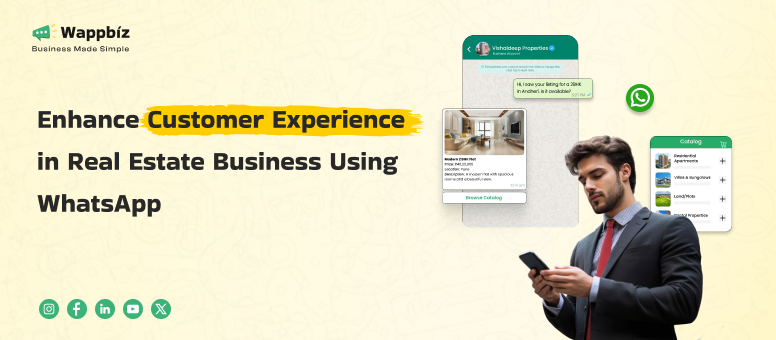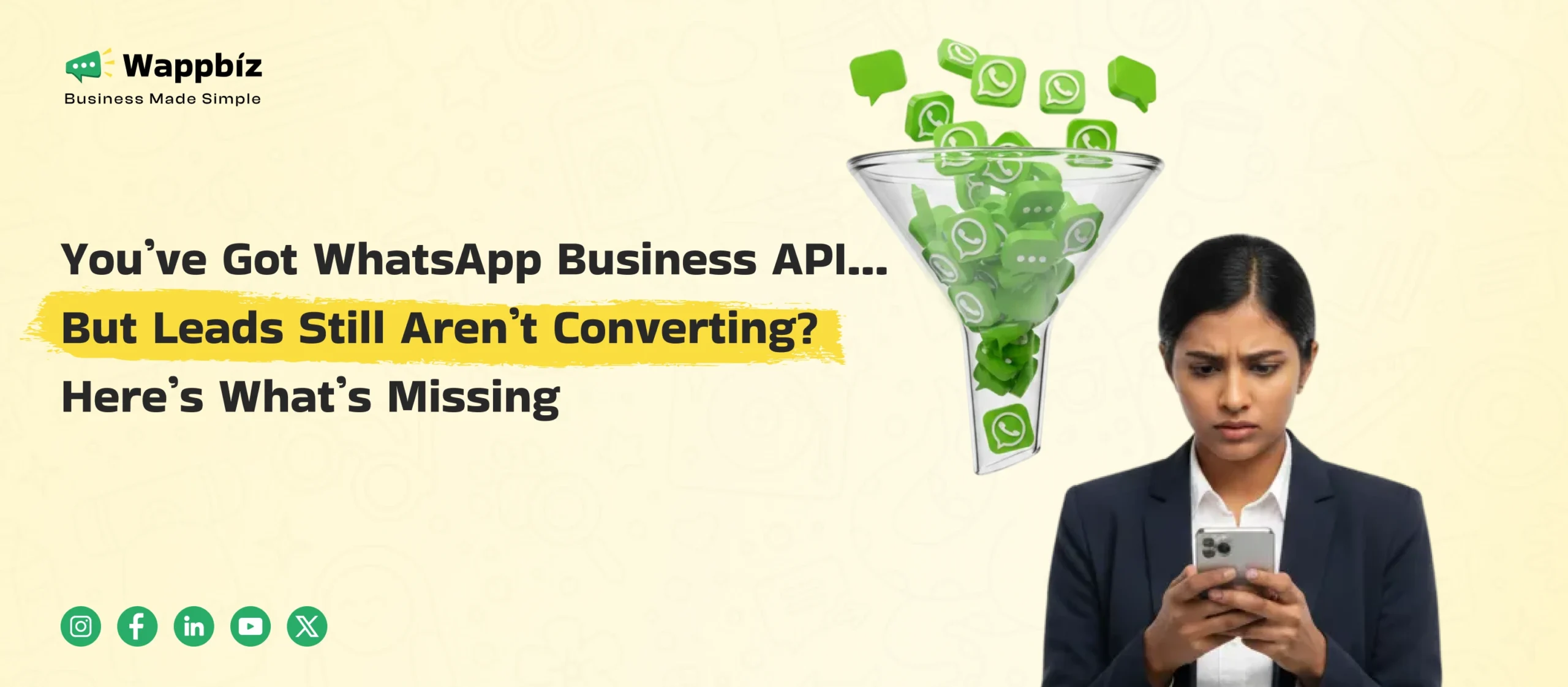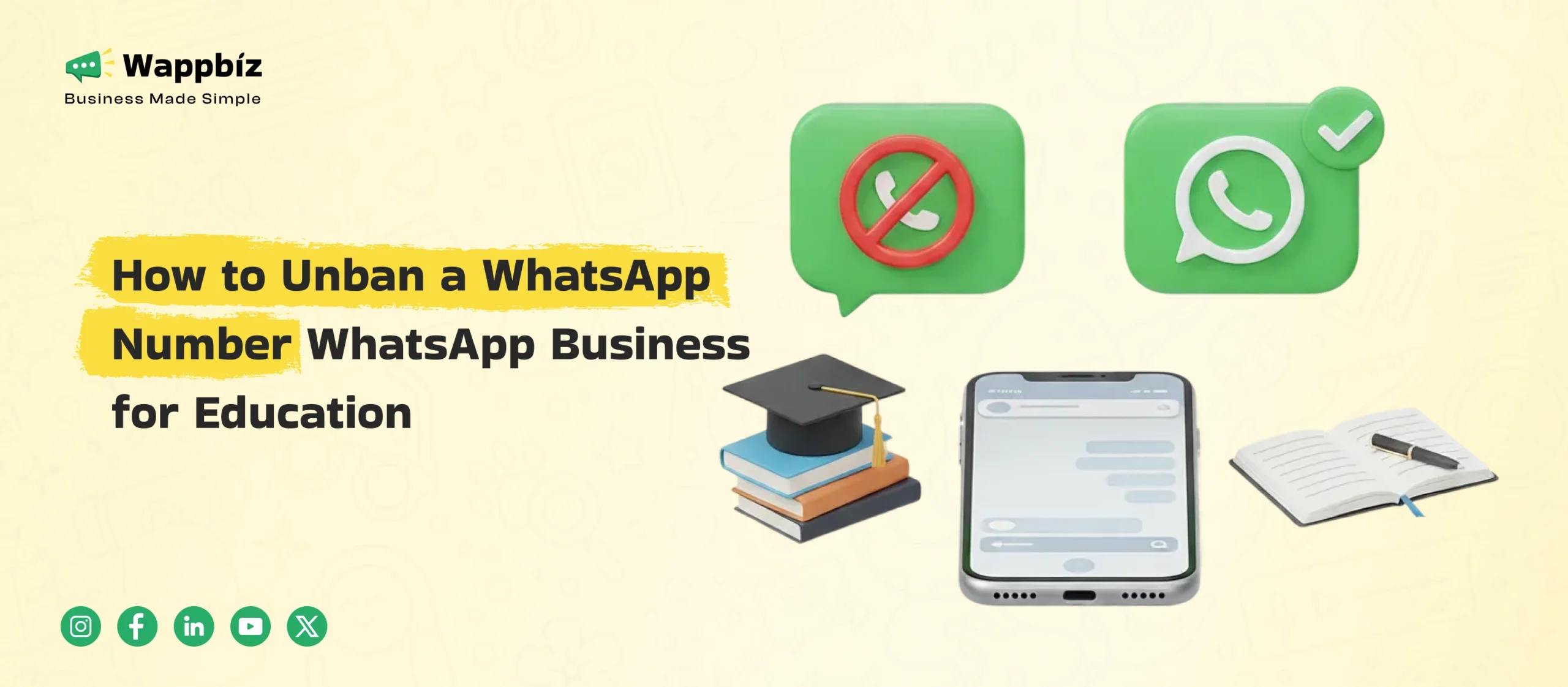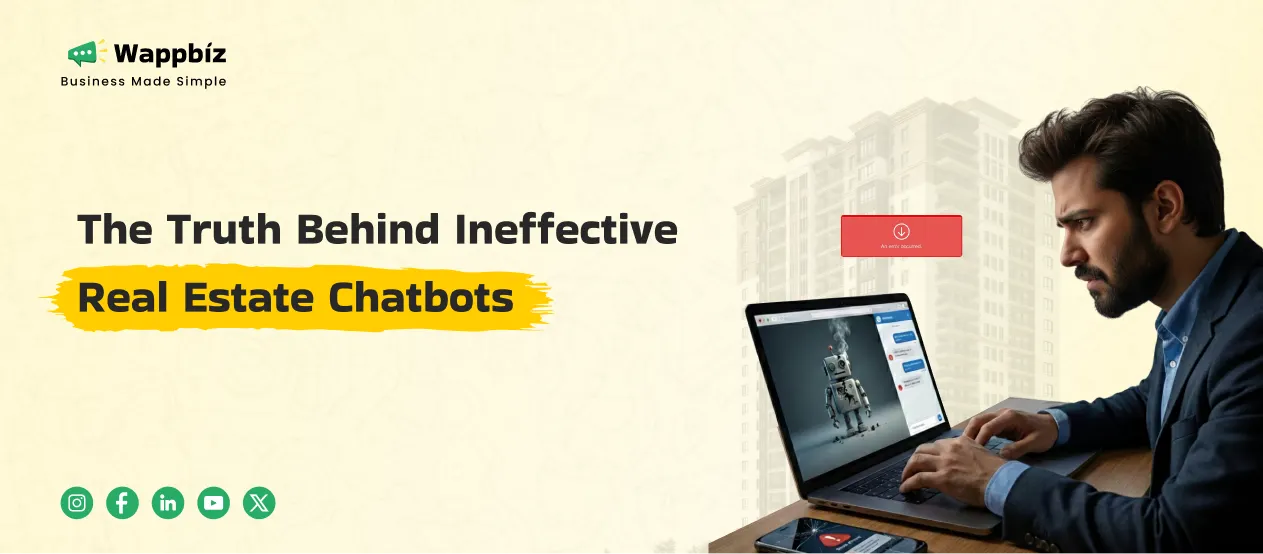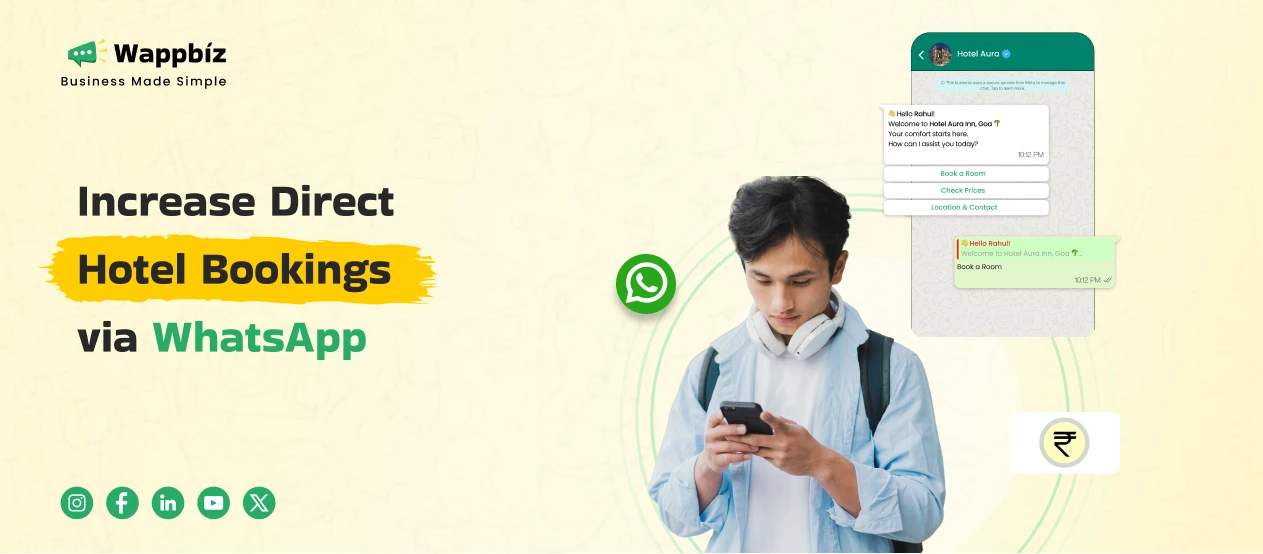In the fast-paced real estate market, speed and responsiveness directly impact conversions. A potential buyer who inquires about a property expects an answer in minutes, not hours. If a lead isn’t contacted within the first five minutes, it sees a conversion rate drop of over 80%. It leads directly to missed opportunities, leads falling through the cracks, and worst of all, a frustrated, modern buyer who just wanted a quick answer.
But the solution isn’t just to use WhatsApp for your real estate business—it’s to use it smarter. Modern real estate buyers expect instant, personalized, and seamless interactions, and that is where WhatsApp becomes a game-changer for customer experience in the real estate business.
WhatsApp as a Customer Engagement Layer
Provide 24/7 Support with Automated Chatbots
The modern buyer browses for properties at 10 PM on a Tuesday. They don’t expect you to be awake, but they do expect an answer. An automated WhatsApp chatbot can handle this 24/7. It can answer common FAQs like “What is the price per square foot?”, “What amenities are included?”, and “Where is the project located?” This bot acts as your round-the-clock front desk, engaging leads while they’re hot and ensuring no query ever goes unanswered.
Instantly Share Virtual Tours and Property Listings
Imagine a potential buyer sending a “Hi” to your number. Instead of a simple “Hello,” your system instantly replies, “Welcome! Are you interested in our 2BHK or 3BHK properties?” One tap later, the buyer is receiving high-resolution images, a PDF brochure, and a link to a 360-degree virtual tour. This immediate, on-demand service not only impresses the buyer but also qualifies them without any human intervention.
Simplify Digital Document Sharing
The property buying process is notoriously document-heavy. WhatsApp simplifies this entire workflow. You can securely send floor plans, booking forms, payment-plan breakdowns, and even location pins. More importantly, when it’s time to collect documents from the buyer (like identity proof or financial statements), they can simply snap a photo and send it back on the chat. This reduces administrative friction and speeds up the booking process significantly.
Integrating WhatsApp with CRM, Analytics, and Automation
Having a powerful engagement layer is one thing. But to truly unlock its potential, you must connect it to your core business systems. A standalone WhatsApp number is just as chaotic as a full inbox. An integrated one is a force multiplier.
Automate Appointment Reminders and Key Follow-Ups
Once your systems are connected, the real magic begins. You can set up automation triggers. For example:
- Site Visit Booked: The system automatically sends a WhatsApp message with a Google Maps link 24 hours before the appointment.
- Post-Visit: Two hours after the scheduled visit, an automated message goes out: “Hope you had a great site visit! Here is a link to our feedback form. Please let us know if you have any more questions.”
- Payment Due: An automatic, polite reminder is sent via WhatsApp three days before a payment installment is due.
Connect WhatsApp to Your CRM for a Full Customer View
This is the non-negotiable first step. When your WhatsApp Business API is integrated with your Customer Relationship Management (CRM) system, every chat is automatically logged. Your agents don’t have to manually copy-paste conversations. They can open a lead’s contact in the CRM and see the entire history—every message, every document sent, and every query in one clean timeline. This single source of truth is a game-changer for professional follow-ups.
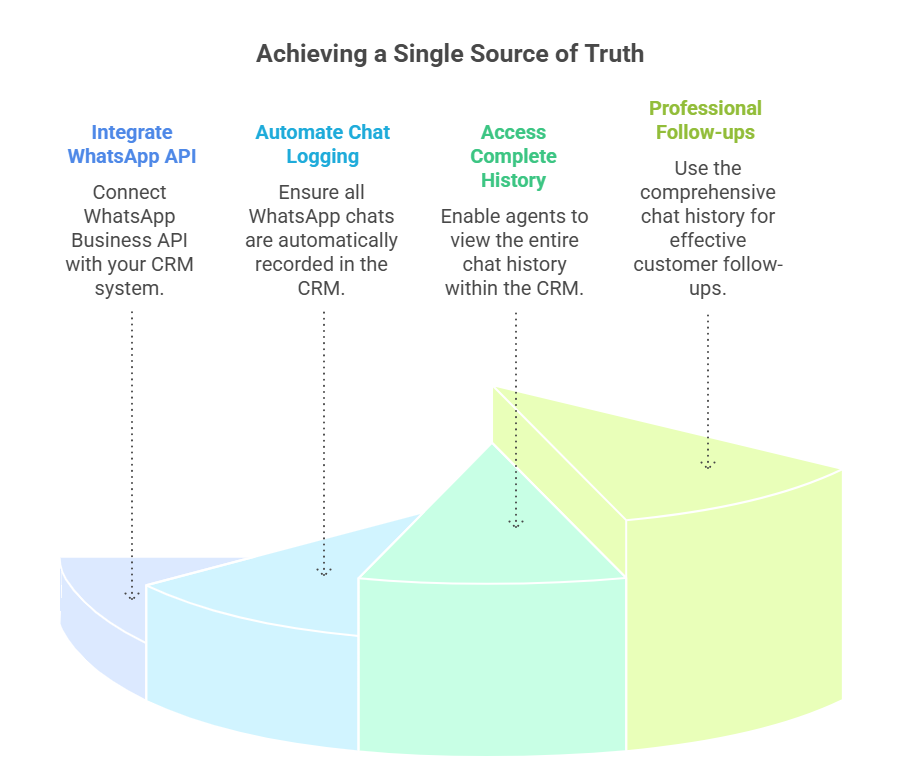
Track Engagement with Built-in Analytics
How do you know what’s working? Integration provides data. You can track key metrics like first-response time, the number of leads generated from WhatsApp, which properties are inquired about most, and even the performance of different sales agents. This data allows you to stop guessing and start making informed decisions about your sales and marketing efforts.
ROI: Speed to Lead and Conversion Impact
So, what’s the bottom-line benefit of all this setup? It comes down to two things: speed and conversion. In real estate, the first agent to provide a helpful answer almost always wins the client.
Capture Hot Leads with Click-to-WhatsApp Ads
You’re already running ads on Facebook and Instagram. But where do they lead? To a clunky website form? With a Click-to-WhatsApp ad, a user sees your property, taps “Send Message,” and is instantly in a WhatsApp chat with your business. There is zero friction. This simple change can double or triple your lead volume from the same ad spend because you’re making it effortless for the customer to connect.
Convert More Leads with Instant Follow-Ups
This is the “speed to lead” advantage. When that Click-to-WhatsApp ad lead comes in, your automated system can respond in less than a second.
- Ad Lead: “Hi, I’m interested in your new project.”
- Auto-Reply (0.1 seconds): “Hi! Thanks for your interest. To help you best, are you looking for a 2BHK or 3BHK?” This instant engagement keeps the lead’s attention and starts the qualification process while you’re still ahead of all your competitors.
Streamline Bookings and Confirmations
The path from “interested” to “booking” should be as short as possible. By integrating WhatsApp, you can have a chatbot qualify a lead, answer their questions, and then present a “Book Site Visit” button right in the chat. The user picks a time slot and instantly receives an automated confirmation. This entire booking process can happen in under two minutes, without a single human agent involved.
The Future of Conversational Sales in Property Buying
What we’ve discussed isn’t a “what if” scenario; it’s what leading real estate firms are implementing right now. But the technology is moving even faster. The next five years will be defined by conversational sales, where the chat itself is the primary sales tool.
The Rise of Advanced AI Sales Agents
The simple chatbots of today are evolving. The AI-powered virtual agents of tomorrow won’t just answer “What is the price?” They will be able to understand nuance, negotiate payment plans, analyze a buyer’s sentiment, and provide hyper-personalized recommendations. They will act as junior sales agents, qualifying leads to a 90%-complete stage before handing them off to a human closer.
How Personalization Will Drive Future Sales
With a CRM and WhatsApp working together, you’ll have a rich history of every customer. The future is about using this data. Imagine a broadcast message that doesn’t just say “New project launch!” It says, “Hi [Name]. Last year, you inquired about 3BHK. We’ve just launched a new luxury 3BHK project in your preferred neighborhood. Here’s a private video tour for you.” This level of personalization builds loyalty and drives sales.
Why Starting Now is Your Competitive Advantage
The future of real estate is conversational. Buyers are already there. The only question is whether your business will be there to meet them. Setting up this integrated system, now getting your CRM, your automations, and your WhatsApp strategy in place, is no longer a “nice to have.” It is the single biggest competitive advantage you can build. Those who wait will be left trying to catch up in a market that has already moved on.
Why Wappbiz is the Best CRM to Automate WhatsApp for Real Estate
The future we’ve described, one of seamless integration, powerful automation, and instant ROI, can seem complex. To access it, you need the right tool. You need a platform that was designed from the ground up to manage this new conversational workflow. That’s where Wappbiz comes in.
Wappbiz isn’t just another CRM or another WhatsApp tool. It is the all-in-one solution that truly focuses on the real estate industry.
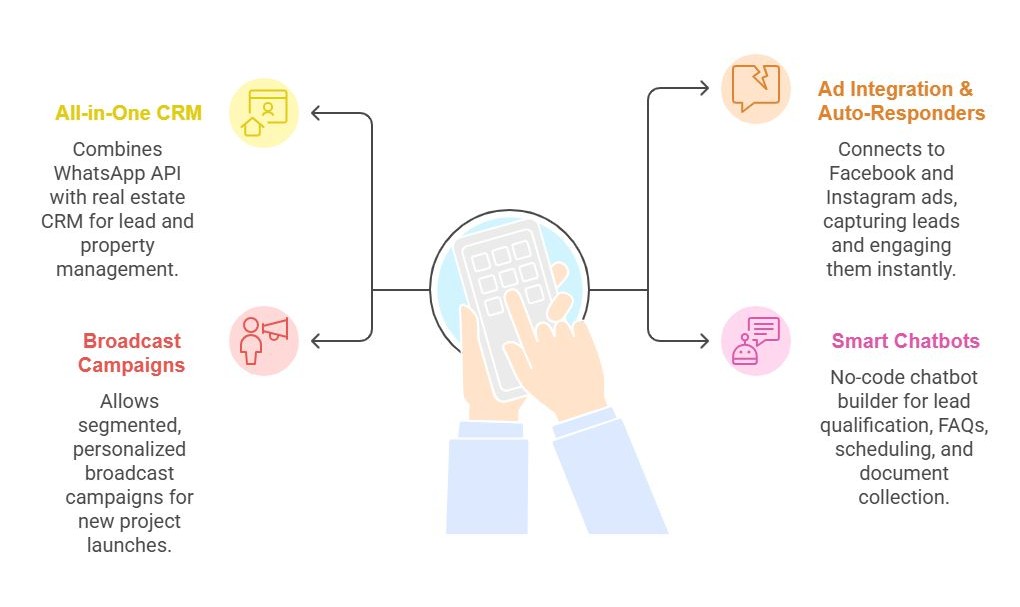
Conclusion
In a market where every missed message can mean a lost deal, WhatsApp Business gives real estate teams the speed, personalization, and consistency today’s buyers expect.
If you’re ready to turn every inquiry into a meaningful conversation (and more closed deals), schedule a demo with WappBiz today and see how it can transform your customer experience.

